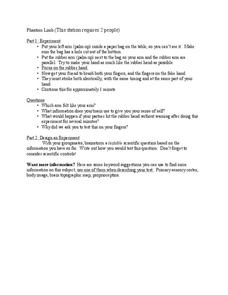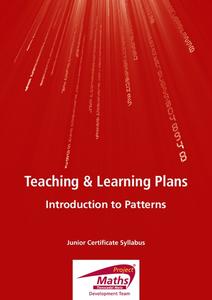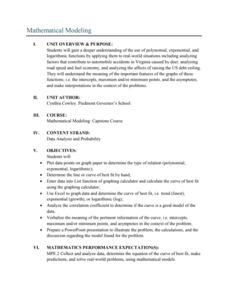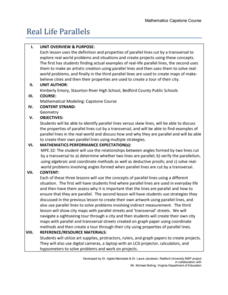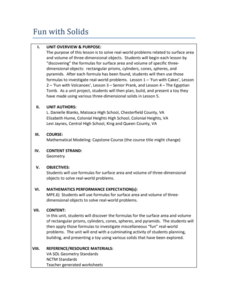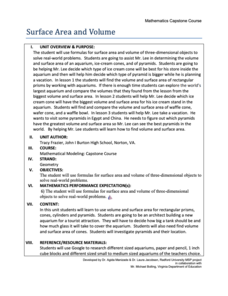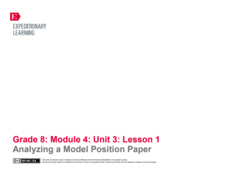Virginia Department of Education
Volume of a Rectangular Prism
Fill the minds of your young mathematicians. A hands-on activity has learners fill in a rectangular prism with unit cubes to determine its volume. the exercise provides a great hands-on way for learners to connect the activity...
University of Minnesota
Phantom Limb
A phantom of neuroscience may leave pupils perplexed as they engage in an experimental lesson that recreates a phantom limb scenario. After experiencing the phenomenon, they choose a scientific question to explore further.
Rube Goldberg
Rube Goldberg Machines
Use humor to study simple machines! An engaging set of nine lessons allows learners to explore simple machines, kinetic, and potential energy as they work through cartoon renditions inspired by Rube Goldberg. Choose one or multiple...
Project Maths
Introduction to Patterns
The world is full of patterns. Help learners quantify those patterns with mathematical representations. The first Algebra lesson in a compilation of four uses a series of activities to build the concept of patterns using multiple...
College Board
The Departure
Scholars learn about the Hero's Journey as they read Ray Bradbury's "The Drummer Boy of Shiloh." They analyze the story's structure and narrative techniques. Finally, they write summaries of the text's central idea and use their...
EngageNY
Close Reading: Paragraph 1 of “Refugee and Immigrant Children: A Comparison” (from “Refugee Children in Canada: Searching for Identity”)
What common challenges do refugees and immigrants face? Using the 9th lesson plan from the 20-part Grade 8 ELA Module 1, Unit 2 series, pupils read about the similarities between refugees' and immigrants' adaptation processes. Partners...
Radford University
Ping Pong Packing
Bounce off some ideas to reduce the amount of wasted space. Teams work together to determine the best size and shape of container to package a large order of ping pong balls. Groups are to design the container to reduce the amount of...
Radford University
Earthquake Problem
Shake up things in the classroom. The unit uses earthquakes to bring a real-life connection to finding arc lengths, logarithms, and equations of circles. Small groups determine whether particular towns would have felt an earthquake after...
Radford University
Government Spending
Spend some time with lines of best fit. An informative unit has learners investigate government spending. They research data on poverty, educational spending, social security, and defense spending, and then analyze lines of best fit for...
Radford University
Mathematical Modeling: Lessons 2-3
Not all functions are created equal. Pupils apply regression analysis using polynomial, exponential, and logarithmic functions to investigate the relationship between variables and to decide which function would be best to model the...
Radford University
Fibonacci is All Around
One ratio to rule them all. Young mathematicians investigate the Fibonacci sequence and the Golden Ratio. To begin the first lesson, they use a spreadsheet to see how the Fibonacci sequence gives the Golden Ratio. The second lesson...
Radford University
Midsummer Classic’s Homerun Derby
Hit a home run with your lessons. A two-part activity has learners explore quadratic equations that model the path of a baseball. They see how changing the initial speed of the ball affects its maximum height, maximum horizontal...
EngageNY
End of Unit 2 Assessment, Part 2: Revise Essay Drafts
Time to revise! Scholars revise their argument essays based on Shakespeare's A Midsummer Night's Dream using feedback from their teacher and peers. They begin their revisions after reviewing a mini-lesson on proper writing conventions.
EngageNY
Studying Conflicting Interpretations: Perspectives on Plessy v. Ferguson: Part 2
The Plessy v. Ferguson case was influential in establishing segregation in the United States. Scholars continue reading the court's decision in the case, seeking to understand the key reasons the court came to its decision. Pupils also...
Radford University
Real Life Parallels
There's no parallel to a great resource. Scholars take part in three lessons in which they investigate parallel lines in real-world situations. They search for and take pictures of parallel lines in and around the school, develop artwork...
Radford University
Fun with Solids
Cakes offer a yummy way to learn about math. Scholars use manipulatives to discover the formulas for the surface area and volume of prisms and cylinders. They use their formulas to calculate the amount of cake mix and frosting necessary...
Radford University
Google Earth Trip
A trip around the world sounds nice, but for now we'll just have to make do with Google Earth. Pupils use pictures of landmarks to apply geometry concepts. They determine whether each building has bilateral or rotational symmetry, search...
Radford University
Surface Area and Volume
Who knew there were pyramids in China? Learners apply surface area and volume formulas to several different real-world situations. They calculate the volume and surface area of an aquarium, an ice cream cone, and Egyptian and Chinese...
Radford University
The Ultimate Kitchen Renovation
Cook up a nice new kitchen. Future designers apply quadrilaterals to design a new kitchen floor. They create a tessellation and determine the area of the pattern. As an added component and real-world application, they must stick to a...
EngageNY
Determining Cascading Consequences Using The Omnivore’s Dilemma: Industrial Organic Food Chain
Organic versus conventional farming: which option is best? Pupils use Michael Pollan's The Omnivore's Dilemma to determine the cascading consequences of the industrial organic food chain. They work in research teams to create an...
EngageNY
Determining Cascading Consequences Using The Omnivore’s Dilemma: Hunter-Gatherer Food Chain
Focusing on the consequences of the hunter-gatherer food chain that Michael Pollan discusses in The Omnivore's Dilemma, teams work together to create hunter-gatherer food chain consequences charts. Next, scholars view other groups'...
EngageNY
Further Research: Hunter-Gatherer Food Chain
It's time to gather nuts, berries, and lots of information. Scholars continue on their quest to determine the consequences of each of Michael Pollan's food chains from The Omnivore's Dilemma. Using research questions developed in a...
EngageNY
End of Unit Assessment: Presentation of Position
What is the difference between formal and informal language? Pupils rewrite their position speeches to adapt them for an audience of adults. Next, they present their speeches in small groups, attempting to answer the question, "Which...
EngageNY
Analyzing a Model Position Paper
What's the difference between a position speech and a position paper? Scholars use a rubric to analyze a model essay about Michael Pollan's food chains to understand what makes them unique. Additionally, pupils create anchor charts...



